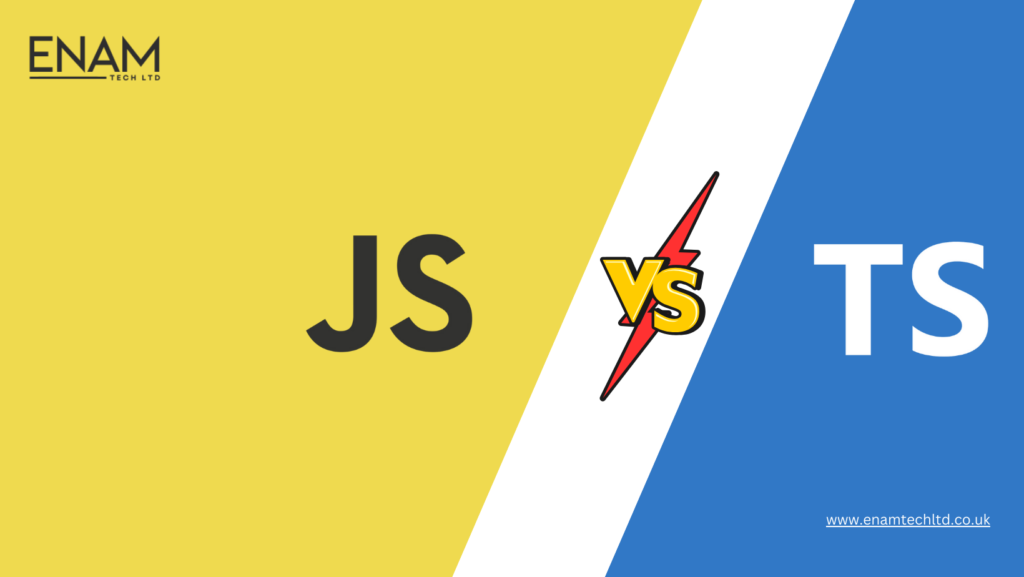JavaScript vs TypeScript: these terms that are commonly encountered in web development. Both are vital tools for building dynamic and robust web applications, but they have distinct features that can impact the development process. Let’s take a closer look at both of them and explore how they compare.
Table of Contents
ToggleWhat is JavaScript?
JavaScript is a versatile, high-level programming language that is primarily used for adding interactivity to websites. Since its inception in 1995, it has become the de facto language for client-side scripting on the web. It allows developers to create responsive, dynamic user interfaces and manipulate the Document Object Model (DOM) on web pages.
JavaScript is an interpreted language, meaning the browser reads and executes it directly without a compilation step. It’s known for its flexibility, as developers can write code quickly and easily. However, this flexibility comes with certain downsides when it comes to larger codebases, such as difficulty in tracking and managing data types.
What is TypeScript?
TypeScript, on the other hand, is a superset of JavaScript that was developed by Microsoft in 2012. It introduces static typing and other features aimed at improving the maintainability and scalability of JavaScript codebases. TypeScript compiles into standard JavaScript, ensuring that code written in TypeScript can run anywhere JavaScript is supported.
The key feature of TypeScript is its type system. This allows developers to explicitly declare the types of variables, function parameters, and return values, making the code more predictable and easier to debug. TypeScript’s enhanced features like interfaces, enums, and classes help developers write cleaner, more structured code.
JavaScript vs TypeScript: Key Differences
Typing System
- JavaScript is dynamically typed, meaning variables can change types at runtime.
- TypeScript is statically typed, offering developers the ability to define variable types at compile time. This helps catch type errors early.
Compilation
- JavaScript doesn’t require compilation. The code runs directly in the browser or Node.js environment.
- TypeScript requires compilation into JavaScript before execution. The TypeScript compiler ensures type safety and other features that are not available in JavaScript.
Tooling and IDE Support
- JavaScript offers limited tooling support, particularly when it comes to refactoring and type validation.
- TypeScript provides more robust tooling. IDEs like Visual Studio Code offer features like auto-completion, refactoring, and error checking, making it easier to work with large projects.
Compatibility
- JavaScript code works across all environments that support ECMAScript standards.
- TypeScript code must be compiled into JavaScript before running, ensuring compatibility with existing JavaScript codebases.
Community and Adoption
- JavaScript has a larger community and is the default language for client-side web development.
- TypeScript has seen a rise in popularity, particularly for large-scale enterprise applications, due to its added features and type safety.
Benefits of Using TypeScript
- Static Typing: TypeScript’s type system reduces bugs by ensuring that variables are used consistently throughout the codebase.
- Maintainability: TypeScript helps manage large codebases by providing a more predictable structure, which is crucial when working in teams or on large projects.
- Object-Oriented Features: TypeScript introduces advanced features such as classes, interfaces, and inheritance, making it easier to build complex applications.
- Improved Tooling: The enhanced IDE support in TypeScript makes development faster and less error-prone.
When to Use JavaScript or TypeScript?
- JavaScript is ideal for small projects or when you need quick, lightweight scripting. It’s best suited for beginners or those working with smaller codebases where static typing might not be necessary.
- TypeScript is better suited for large-scale applications where maintainability, scalability, and collaboration are essential. If your project involves complex logic or a team of developers, TypeScript can save time and reduce bugs.
FAQ Section
Is TypeScript better than javaScript
TypeScript is not necessarily better than JavaScript, but it provides added features like static typing and improved tooling that help with maintainability and scalability, especially in large codebases.
Is TypeScript going to replace JavaScript?
No, TypeScript is a superset of JavaScript. It compiles down to JavaScript and will not replace it. JavaScript remains essential for web development, and TypeScript works alongside it.
Is TypeScript used for frontend or backend?
Developers use TypeScript for its static typing, enhanced tooling, and features like interfaces and classes, which improve code quality, maintainability, and help catch bugs early in large-scale applications.
Can I use TypeScript with React?
Yes, TypeScript works seamlessly with React. Many React developers use TypeScript for its type safety and improved developer experience.
Is JavaScript going obsolete?
No, JavaScript is not going obsolete. It is still the most widely used language for web development and continues to evolve with new features in ECMAScript standards.
Should I use TypeScript or JavaScript for Next.js?
Next.js supports both JavaScript and TypeScript. TypeScript is recommended if you’re working on a larger or more complex project, as it offers better tooling and type safety.
Is TypeScript bigger than JavaScript?
No, TypeScript is not “bigger” than JavaScript. JavaScript is the base language, and TypeScript is a superset that adds additional features, making TypeScript code compile to JavaScript.
Is it hard to learn TypeScript?
If you’re already familiar with JavaScript, learning TypeScript should be relatively easy. The primary challenge is understanding its static typing system, but it adds significant benefits once mastered.
Conclusion: JavaScript and TypeScript Complement Each Other
Rather than seeing TypeScript as a replacement for JavaScript, it’s important to view it as an enhancement. TypeScript takes JavaScript and builds upon it by adding features that improve code quality and maintainability. Many modern frameworks like Angular and libraries like React support TypeScript, making it a valuable tool in the web development ecosystem.
Ultimately, both languages have their place in modern web development. Whether you choose JavaScript or TypeScript depends on your project’s requirements, team size, and long-term maintenance goals. As the ecosystem continues to evolve, both languages are sure to remain pivotal in shaping the future of web development.




